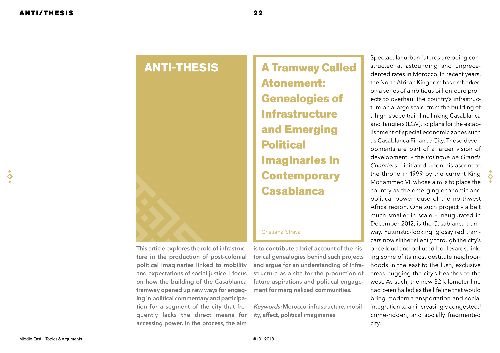A Tramway Called Atonement: Genealogies of Infrastructure and Emerging Political Imaginaries in Contemporary Casablanca
This article explores the role of infrastructure in the production of post-colonial political imaginaries linked to mobility and expectations of social justice. I focus on how the building of the Casablanca tramway opened up new ways for engaging in political commentary and participation for a segme...
Sábháilte in:
| Foilsithe in: | Middle East - Topics & Arguments |
|---|---|
| Príomhchruthaitheoir: | |
| Formáid: | Artikel (Zeitschrift) |
| Teanga: | Béarla |
| Foilsithe / Cruthaithe: |
Philipps-Universität Marburg
2018
|
| Ábhair: | |
| Rochtain ar líne: | Rochtain ar líne |
| Clibeanna: |
Níl clibeanna ann, Bí ar an gcéad duine le clib a chur leis an taifead seo!
|
| Achoimre: | This article explores the role of infrastructure in the production of post-colonial political imaginaries linked to mobility and expectations of social justice. I focus on how the building of the Casablanca tramway opened up new ways for engaging in political commentary and participation for a segment of the city that frequently lacks the direct means for accessing power. In the process, the aim is to contribute a brief account of the historical genealogies behind such projects and argue for an understanding of infrastructure as a site for the production of future aspirations and political engagement for marginalized communities. |
|---|---|
| DOI: | 10.17192/meta.2018.10.7590 |
